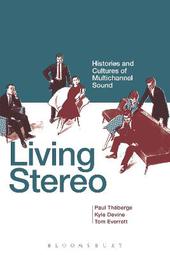
|
Living Stereo: Histories and Cultures of Multichannel Sound
Paperback / softback
Main Details
| Title |
Living Stereo: Histories and Cultures of Multichannel Sound
|
| Authors and Contributors |
Edited by Paul Theberge
|
|
Edited by Kyle Devine
|
|
Edited by Tom Everrett
|
| Physical Properties |
| Format:Paperback / softback | | Pages:298 | | Dimensions(mm): Height 229,Width 152 |
|
| Category/Genre | Theory of music and musicology
Music recording and reproduction |
|---|
| ISBN/Barcode |
9781623566654
|
| Classifications | Dewey:781.490904 |
|---|
| Audience | | General | | Professional & Vocational | | Tertiary Education (US: College) | |
|---|
| Illustrations |
8 bw images
|
|
Publishing Details |
| Publisher |
Bloomsbury Publishing PLC
|
| Imprint |
Bloomsbury Academic
|
| Publication Date |
26 March 2015 |
| Publication Country |
United Kingdom
|
Description
Stereo is everywhere. The whole culture and industry of music and sound became organized around the principle of stereophony during the twentieth century. But nothing about this-not the invention or acceptance or ubiquity of stereo-was inevitable. Nor did the aesthetic conventions, technological objects, and listening practices required to make sense of stereo emerge fully formed, out of the blue. This groundbreaking book uncovers the vast amount of work that has been required to make stereo seem natural, and which has been necessary to maintain stereo's place as a dominant mode of sound reproduction for over half a century. The essays contained within this book are thematically grouped under (Audio) Positions, Listening Cultures, and Multichannel Sound and Screen Media; the cumulative effect is to advance research in music, sound, and media studies and to build new bridges between the fields. With contributions from leading scholars across several disciplines, Living Stereo re-tells the history of twentieth-century aural and musical culture through the lens of stereophonic sound.
Author Biography
Paul Theberge is a Professor cross-appointed to the Institute for Comparative Studies in Literature, Art and Culture (where he was formerly Canada Research Chair and Director) and to the School for Studies in Art and Culture (Music) at Carleton University, Canada. Kyle Devine is Lecturer in Music at City University London, and a research associate with the Music and Digitisation Research Group at the University of Oxford. Tom Everrett is an instructor in the School of Journalism and Communication and member of the Hypertext and Hypermedia digital humanities research centre at Carleton University, Canada.
ReviewsIn this volume, Theberge, Devine and Everrett have gathered together a fascinating body of writing on the technical, psychological and social construction of stereo. The collection represents another important step in the growing body of scholarship on how recorded music differs from music on the concert stage and in the score. While the individual chapters provide some fine grained detail, the editors have situated them into the broader context of the burgeoning new discipline of sound studies. * Dr. Simon Zagorski-Thomas, Co-Chair of the Association for the Study of the Art of Record Production & Reader in Music, London College of Music, UK * This timely, rich and compelling book traces the staging of auditory perspective and experience in stereo sound at home, the concert hall, the cinema and beyond. It situates stereo sound so carefully in historical and contemporary cultures of science, commerce and listening that the book is itself a "sweet spot" in studies of sound and music. * Karin Bijsterveld, Professor of Science, Technology & Modern Culture, Maastricht University, Netherlands * Sound technology is increasingly understood as sound technologies. There is no single technology that informs the recording and reproduction of sound, but a vast array of different technologies, drawn from the separate fields of telephony, music recording, radio, film, television, and gaming, not to mention military applications of sound technology used in sonar equipment. As the study of individual sound technologies has evolved into the new field of "sound studies," scholars have begun to rethink the relations between and among different forms of sound technology. Living Stereo provides a site and a topic that serves as an exemplary model of recent scholarship on sound from the vantage point of outstanding scholars drawn from an array of disparate fields. The result is a multi-channel portrait-perhaps "soundscape" would be a better term--of stereophonic sound from the 1880s to the present. * John Belton, Professor of English and Film, Rutgers University, USA * Like the best of anthologies, Living Stereo not only brings together a broad array of exciting work on its subject but also suggests that much work remains to be done. Rather than simply previewing the essays that follow, the introduction provides a conceptual basis for future engagements with stereo (and indeed other media technologies) in terms of technological practices, systems of cultural assumptions, and the intersection of commercial constraints and the logistics of listening. * Steve Wurtzler, Professor of Cinema Studies, Colby College, USA * "...A collection of clearly keen intellects deconstructing hitherto tacitly accepted "truths" about stereo production and consumption, in a manner that usually causes the reader to question what they actually know about these topics. The quality of the scholarship and clarity of the writing is excellent, and each chapter boasts healthy bibliographic citations and commentary that regularly motivated me to follow sources and learn more...the value of the individual essays is so high that it easily earns its place on library shelves and in private collections. * ARSC Journal (Association for Recorded Sound Collections) *
|